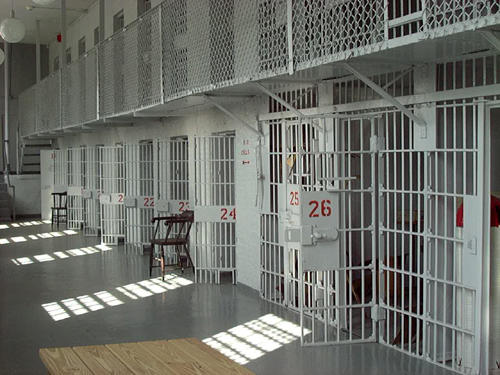
Section Branding
Header Content
Bail Project, blaming state law, ceases operations in Georgia
Primary Content
LISTEN: A charity says because of Senate Bill 63, which adds new restrictions on charitable bail funds and new crimes that require cash bail, it's stopping its work in Georgia effective Monday. GPB's Peter Biello speaks with Jeremy Cherson of the Bail Project about it.

A charitable bail fund says it's shutting down its Georgia operations because of a new state law. The Bail Project says because of Senate Bill 63, which adds new restrictions on charitable bail funds and new crimes that require cash bail, it's stopping its work, effective Monday. For more on why we turn to the Bail Project's communications director, Jeremy Cherson. He spoke with GPB's Peter Biello.
Jeremy Cherson: Thank you for having me, Peter.
Peter Biello: So bail funds like yours help people come up with the cash needed to avoid long stays in jail before trial. Your organization does other things as well, but we'll start with that. This new law adds restrictions to bail funds. You're supposed to now meet the legal requirements to be a bail bond company, and you can only help three people per year even if you do. So put this into perspective for us. How many people in Georgia did the Bail Project regularly help before this law?
Jeremy Cherson: We've been operating in Atlanta and Georgia for about four years, and in that time, we've helped about 1,000 Georgians who've returned to court about 90% of the time, which is really what we're trying to show: is that cash bail is an unnecessary incentive to ensure that somebody returns to court, and our work demonstrates that. We provide simple support like court notifications, travel assistance to and from court, and we connect people with voluntary supportive services. That could be anything from drug treatment to mental health counseling to employment support. And we find that that is very successful. So it's very dispiriting and frustrating for us to see the Legislature attack charitable bail organizations at this time, because I think we represent and fill a gap in a needed space for pretrial services and support.
Peter Biello: Those pretrial services: Are those also being curtailed in Georgia?
Jeremy Cherson: Well, our operating model is such that we provide those sorts of supportive services to our clients once they become our clients. And with the new law, we won't be able to take on new clients anymore. So yes, in effect, though the clients that are still active, those whose cases are still pending with us currently, we'll continue to support them until their case is closed.
Peter Biello: I see. The new law requires cash bail for 30 additional crimes, including 18 that are always or often misdemeanors. So even if you were allowed to operate the way you used to, I imagine that this requirement alone would have put a strain on your operations. Correct?
Jeremy Cherson: It would have logistically strained our operation. So, for example, if they just expanded this sort of net by which there's a mandate that bail be set, we would have had a variety of additional offenses that would now be eligible for bail and would require us to help more. And I think that's why we see this law as being really detrimental and counterintuitive. You are, at one end, deciding to expand the application of cash bail — which is a broken public policy; it doesn't work — and on the other hand, you're trying to attack a humanitarian charitable intervention that's really out there trying to support people who are in need. You know, it's important for us to emphasize and state that cash bail is a — creates a two-tiered system of justice, one where people who have money can pay bail and people who don't are unnecessarily detained in many instances. That's a broken public policy, because the system should be organized so that safety, not wealth, determines who's incarcerated, pretrial.
Peter Biello: Supporters of this law say that crime victims felt the justice system didn't care about them when suspects were released without cash bail. What did you make of that argument?
Jeremy Cherson: I think it's important that we be conscious of victim service — people that work for victims and support victims. I think that they have a valid point of view here. Again, I still think that you don't solve that problem by allowing a cash bail system to continue to exist and persist. You do it by changing the system so that, safety, not wealth, determines who's incarcerated, pretrial.
Peter Biello: What do you suspect the impact on jails will be now that programs like yours, nonprofits like yours, can't operate the way they used to?
Jeremy Cherson: ... It won't help. Fulton County, for example, is already facing an overcrowding crisis that they've been dealing with for a while. A lot of that has to do with the egregious case processing delays that exist in the county, compared to other places where we operate. You know, people's cases last four times longer in Fulton County than they do elsewhere. There are people that get arrested and aren't even indicted for a year. When people can't afford to pay bail and the release mechanisms don't exist and people are detained and their cases aren't moving, they are effectively being punished before they've even been proven guilty of anything. So I think this kind of law, now that it's passed, will expand the number of people that are in jail and it will lead to overcrowding, and that will cause a strain on governmental resources. It'll probably make the jails more dangerous than they currently are.

